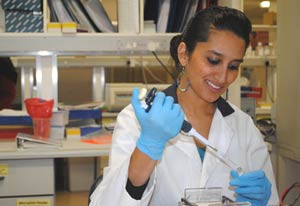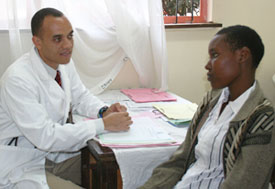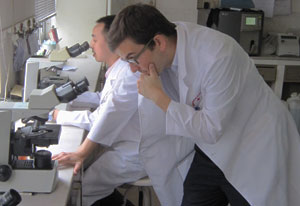$20M awarded to establish research training network
March / April 2012 | Volume 11, Issue 2

Photo by Belinda O'Donnell
Fogarty is awarding $20 million to foster the next
generation of global health research leaders
through its Fellows and Scholars program. Raabya
Rossenkhan, a previous program participant,
studied infectious diseases in Botswana.
To help foster the next generation of global health scientists, Fogarty and its NIH partners are building a network of U.S. academic institutions to provide early-career physicians, veterinarians, dentists and scientists with a significant mentored research experience in a developing country.
About $20.3 million will be awarded over the next five years to support 400 early-career health scientists on nearly year-long research fellowships in 27 low- and middle-income countries. The Fogarty Global Health Program for Fellows and Scholars will provide five consortia of academic institutions with about $4 million each, to support the training activities of a total of 20 partner institutions. In addition to Fogarty, 17 NIH institutes and centers (listed below) have expressed an interest in contributing funds to the effort, if there are qualified scholar and fellow applicants with relevant expertise.

Photo courtesy of Dr. Gerald Bloomfield
To combat the rising tide of chronic diseases
in Kenya, Dr. Gerald Bloomfield focused on
training local health care workers in
cardiology as part of his Fogarty fellowship.
Each consortium will develop and support global health research training programs that provide focused mentoring for participants and diverse clinical research experiences at approximately 80 established research sites in low-resource settings. Program trainees will study the traditional global health problems such as HIV/AIDS, tuberculosis, malaria and maternal and child health, and will address the chronic non-communicable diseases that cause a majority of deaths in developing countries, such as cancer, cardiovascular disease and diabetes.
"In combining the enthusiasm of today's young scientists with the knowledge and wisdom of America's global health leaders, we are forming a powerful network to produce a new generation of stellar researchers capable of working in the global arena," said Dr. Roger I. Glass, Fogarty's director. "This program will leverage the considerable experience, relationships and infrastructure the 20 U.S. partners have built in developing countries around the globe, together with the depth and diversity of their subject matter expertise, to ensure our alumni are well-equipped to tackle the world's most pressing health problems."

Photo courtesy of Dr. Joe Tucker
Dr. Joe Tucker worked to increase syphilis and
HIV screening in China during his Fogarty
fellowship.
The program will enhance the career trajectory of the participants, strengthen the global health research programs at U.S. and foreign institutions, and will bolster networking among program alumni and senior scientist mentors. Eighty percent of the program's trainees will be post-doctoral fellows, with 20 percent entering as doctoral students.
Participating institutions were required to demonstrate they possess the capacity to provide outstanding mentored global health research education experiences, existing robust research and training activities at a developing country site, and established relationships among consortia members.
Since 2004, Fogarty has supported more than 500 fellows and scholars for significant hands-on, clinical research training experiences in low- and middle-income countries. The program was most recently managed by a coordinating center at Vanderbilt University.
NIH entities supporting the program include the Eunice Kennedy Shriver National Institute of Child Health and Human Development (NICHD), National Cancer Institute (NCI), National Eye Institute (NEI), National Heart, Lung, and Blood Institute (NHLBI), National Institute of Allergy and Infectious Diseases (NIAID), National Institute of Arthritis and Musculoskeletal and Skin Diseases (NIAMS), National Institute of Biomedical Imaging and Bioengineering (NIBIB), National Institute of Dental and Craniofacial Research (NIDCR), National Institute of Diabetes and Digestive and Kidney Diseases (NIDDK), National Institute on Drug Abuse (NIDA), National Institute of General Medical Sciences (NIGMS), National Institute of Mental Health (NIMH), National Institute of Neurological Disorders and Stroke (NINDS), National Institute of Nursing Research (NINR), Office of AIDS Research (OAR), Office of Research on Women's Health (ORWH), and the Office of Behavioral and Social Sciences Research (OBSSR).
University of California, Berkeley - Consortium lead
Florida International University, Miami
Stanford University, Stanford, C.A.
Yale University, New Haven, C.T.
University of California Global Health Institute - Consortium lead
University of California, Davis
University of California, Los Angeles
University of California, San Diego
University of California, San Francisco
University of North Carolina, Chapel Hill - Consortium lead
Johns Hopkins University, Baltimore, M.D.
Morehouse School of Medicine, Atlanta, G.A.
Tulane University, New Orleans, L.A.
University of Washington, Seattle - Consortium lead
University of Hawaii, Honolulu
University of Michigan, Ann Arbor
University of Minnesota, Minneapolis
Vanderbilt University, Nashville, Tenn. - Consortium lead
Cornell University, Ithaca, N.Y.
Duke University, Durham, N.C.
Emory University, Atlanta, G.A.
More Information
To view Adobe PDF files,
download current, free accessible plug-ins from Adobe's website.